The following is an edited transcript of an interview with Dr Mubashir Hasan:
QUESTION: How do you look at the prevailing highly polarised situation in the country and how the present crises — Balochistan, water issue, constitutional amendments — can be resolved?
ANSWER: The principal problem in Pakistan is that the system of governance is becoming weaker. Crime is increasing; the state is becoming more and more unpopular; and the contract between the state and the people is slowly vanishing. There is nobody either among the elite or among the people who helps the police, who goes to court to give evidence. In fact the hatred between the “ahalkars” (functionaries) of the state and the people is increasing.
The elite of Pakistan stand divided into provincial elites, educated and non-educated elites, the industrial elite and, above all, the military elite.
The military elite have a contempt for the people and the people have become alienated from the military as never before. Another problem is that the people think that the government is not sovereign. It is an agent of the United States, and they don’t like the US.
These are the main problems of Pakistan where genuine political forces have not developed. They have been hijacked throughout by the intelligence services.
Q: You know better the circumstances in which the 1973 Constitution was drafted and how a consensus on the various national issues, including the issue of provincial autonomy, arrived at. Is it possible now or is it necessary to formulate a new dispensation and arrive at a new social contract?
A: I was a part of the negotiations in Oct-Nov 1972. And I believe that the negotiating parties, the ANP and the PPP, or the Frontier and Balochistan, did not know what autonomy is. I give you one example. I was ill in those days with a back problem. Rafi Raza and Hafeez Pirzada came to me and said they had reached an agreement with Wali Khan on political points. ‘But we have yet to formulate a policy about economic matters. You tell us what to do.’
They brought the deputy chairman of the Planning Commission and the finance secretary with them. I told them to leave the papers with me and come in the evening. In the evening Rafi Raza and Hafeez came again. I told Hafeez to tell Mr Bhutto not to come to the meeting planned for the morning.
I went to that meeting and told them [the Baloch and Frontier leaders], ‘You give the federal government what it needs for its expenditure, and you take the rest. You take everything.’ The Frontier government was represented by their chief minister, Mufti Mehmood, Governor Arbab Khalil, Ghulam Farooq and another gentleman. Balochistan was represented by Ghaus Bakhsh Bizenjo, Ataullah Mengal, and two other gentlemen.
When I made the offer, Mufti Mehmood spoke, ‘Dr Sahib, all tobacco is produced in the NWFP, but why does Punjab and the centre take taxes on that?’
I explained the quantum of taxes on tobacco and cigarettes. I told them that the factories are located in Punjab and other places. And I asked Mufti Sahib to let us give the duty on agricultural products to the provinces. He enquired what Punjab would get. I said, ‘Cotton.’ ‘How much will that be,’ he asked. I said, ‘Rs 34 crore.’ Their demand for tobacco was about Rs 9 crore. So they said, ‘No, no, leave it as it is.’ The matter was over.
Then spoke Mr Arbab Sikandar Khalil and he said, ‘We have all the rivers and the mountains and we are not allowed to generate electricity.’ I told them I had no problem with that. ‘You generate your own electricity.’ He asked if they could make their own power houses. I said, ‘Yes. Make your own power houses, make your own transmission lines.’ That issue came to an end also. Then he said, ‘Tarbela dam is in Punjab but the power house is in the Frontier, so we should get profit on power generation.’ I said, ‘I have no objection to this.’
When the demands of the political leaders ended, Ghulam Farooq spoke, ‘There should be a National Finance Commission.’ I said, ‘Let there be an NFC.’
Now came Balochistan’s turn. Ghous Bakhsh Bizenjo said that all the gas was produced in Balochistan and they didn’t get a bubble of it and we took all the taxes. I explained the reason for the centre keeping a certain amount of taxes on gas — a certain amount for distribution and for maintaining uniform price - and asked them to keep the rest.
Then he said there was no electricity, no development, and Wapda didn’t do anything. I said, ‘Let us break up Wapda. You make your own Wapda.’ He said, ‘But we don’t have engineers,’ and so that matter ended.
In the meanwhile a man came and whispered in my ear that Mr Bhutto wanted to give something special to Mr Bizenjo. All this conversation took half an hour. When this was over I told Hafeez to go and call the prime minister. He came, apologizing for being late because he had to see some important ambassadors. He asked me for details. I told him everything. Then he said I had done an injustice to Balochistan.
At that point I wrote down on a piece of paper “Taxes on oil” and pushed it before him. He was very clever. He immediately said, ‘You have given them taxes on gas but what about oil?’ I said. ‘You announce that.’ And so he did. They were not ready for it. We had not ruled. We didn’t know that control over money was important. But by asking for the NFC they demolished everything. So all these things that I agreed to are part of the Constitution. They did not know that by adding these subjects to the concurrent list and having a law that if there is a clash between federal legislation and provincial legislation, federal legislation would prevail, they were losing everything. They thought they got provincial autonomy; they signed all the documents, but they got nothing.
Q: It is being said that it is not only a struggle for economic or political empowerment or a struggle against denial of rights but that we are heading towards a scenario that is akin to the six points of Sheikh Mujibur Rahman and the situation thereafter in the former East Pakistan.
A: When the centre becomes weak the “subedars” become strong. Now the central power is weakening. So the provinces, in my opinion rightly so, are demanding their powers. One big problem was that the Council of Common Interest (CCI) was created, but the opposition since 1972 has never demanded that this be created as intended. During the initial discussions over the future constitution of Pakistan in 1972, the leaders of political parties in the Constituent Assembly had expressed strong resentment against the absolute control exercised by the central government over matters of oil, gas, electricity, river waters, dams, railways, industrial projects, etc, etc.
To satisfy the demands from leaders of all the four provinces, the innovative provision of the Council of Common Interest was laid down as Article 153. Through Articles 153-155, the 1973 Constitution made the four provinces of Pakistan shareholders in some of the decisions which interested them greatly and were traditionally treated as purely federal subjects.
Mind you, the Constitution places the decisions of the Council of Common Interest (CCI) on a status higher than the decisions of the federal or provincial governments.
The constitutional provisions mean that the president, federal government, the National Assembly, the Senate and provincial governments are obliged to honour the decisions of the CCI. The CCI alone has the authority to formulate and regulate policy and exercise control and supervision over operations relating to subjects specified in Part II of the Federal Legislative List. If you want to seriously revive the CCI, the government will have to put ministries dealing with water, power, oil, minerals, railways, steel mills and other industries under ministers who are designated as members of the CCI. The CCI is not to be responsible to the federal government.
Q: How do we actually resolve the question of political and economic empowerment and the quantum and form of provincial autonomy?
A: It is quite simple. Leave with the federation only defence, foreign affairs, communications, currency, meteorology, shipping, weights and measures, and give the rest to the provinces. This is as far as the division of subjects go. The federally appointed civil servants should not work in the provinces. They should work only in relation to the subjects of the federation. So all civil servants in a province should be under a province. The judiciary should not be connected with the Supreme Court and SC judges should not be promoted from the provinces. It should be decided what this power means. Whether the centre can declare an emergency. The fighting is in one part of Balochistan and they have imposed an emergency in the whole country. How can they assume all provincial powers to themselves?
Q: At the moment whatever is happening in Balochistan, especially in Dera Bugti and elsewhere, and whatever the army is doing, is that the whole truth?
A: The army is responsible for law and order. If there is defiance of law and order, the government has to come into action. But then coming into action is one thing and deciding the matter on the basis of brute force is another. Ultimately all wars have to be settled at the peace table. The sooner this is done the better.
Q: But why is the government using force against the people?
A: Like an imperial power they are pretending or claiming to be there for development and for “civilizing” the people. They pretend that “my land is God’s land”. But the actual purpose is to go there to capture oil markets, and capture banks. I went to Balochistan last month and on the basis of that experience I can say that the question does not arise that the military will be able to control the situation there in the long run. There are many contradictions between the sardars and their people, among the sardars themselves and between them and the federal government, federal government and the people, and the arms suppliers.... Militancy is all over Balochistan. It’s not confined to the Marri and Bugti areas alone. All youngsters are involved. Earlier I had gone to Srinagar, Kashmir, and there I found that it was wrong to say that the uprising in the Valley was the outcome of the mujahideen sent from here. Whichever poor Kashmiri I met there told me that he was a trained person. He told me that his relatives had been killed or arrested by the Indians and he had himself been held several times.
Q: Are conditions congenial for amicable constitutional changes despite the polarization?
A: Yes, if they bring genuine amendments to which the provinces agree. New constitutional arrangements only mean making amendments in certain articles of the Constitution. No big change is involved which will give full autonomy to the provinces. In addition it’s not enough to give autonomy to the provinces. It is essential that power should devolve down below also, to districts and talukas, because dictatorship in Pakistan exists mostly because the government machinery is under the control of the highest level. Central governance makes dictatorship possible.
Q: Who will bring in those amendments? They (the opposition) are challenging the authority of Gen Pervez Musharraf?
A: If you are giving me something, I’ll take it. I am living under his government. What nonsense this is, that we don’t accept.
Q: In a set-up like this where you have a military ruler and democracy is not full-fledged, how do you welcome the revival of the CCI? Do you think it is going to work?
A: Anything that gives me power, I welcome. Anything that gives me power over Wapda or railways or gas, I will welcome that.
Q: Do you think it will be practically implemented?
A: Depends on how forcefully I ask for it.
Q: But in the presence of the National Security Council (NSC) how much freedom will the CCI enjoy?
A: What is the NSC? Tell me of any decision of the NSC which has been implemented. It does not have any legislative power. There is nothing in the Constitution explaining its powers or modus operandi for implementation of its decisions.
Q: How can the water issue be resolved in the light of the decisions announced by General Musharraf? Is there enough water?
A: When you build a dam to store water that water will ultimately come to you, unless it is taken away for the purpose of irrigation to some other land. On the Chenab and the Jhelum there are no prospects that by storing water in the run of river plants, as allowed by the Indus Basin Treaty, Pakistan will be deprived of water — except in a time of war. But that is different. It has been stated in the treaty that all water that comes to Baghliar dam during 24 hours, beginning Monday, 8 am, will have to be discharged below in the same 24 hours. For Salal Dam it is written that all water that accumulates there in one week will be discharged during the same week. If India makes a tunnel and takes Chenab water to the Ravi, then there is a breach of treaty and that will really mean less water in Pakistan.
Q: There are some studies suggesting that they are diverting water to irrigate land in Rajhastan, Haryana and Punjab.
A: No there is no such thing. All wrong. Lots of false information. On Kishenganga they are taking water from one tributary and putting it into another. So there will be no shortage of water in the Jhelum.
Q: But Neelam will face the shortfall.
A: Yes, Neelam will face a shortage. Pakistan also says that it has planned a project on the Neelam. But that is simply on paper. Now this dam on the Kabul river. I don’t know. Afghanistan is a large area which can be irrigated, taking water from the river Kabul. That must be for hydro power or for drinking water.
Q: People have gone through a long ordeal of polarization on Kalabagh dam and many things were said by different parties.
A: The tragedy of Kalabagh is that the task of designing it was given to the World Bank by Gen Ziaul Haq and in that assignment the Government of Pakistan is defined as the cooperating government. Not as owner or anything, but as a cooperating government. And Wapda is defined as the liaison agency. They produced a design which was highly inflated in cost and defective in engineering. That design came up for approval in 1984. As a result of that design they asked to put marks on houses in Nowshera to identify the water level. In the cost of the design they decided to raise the level of the rail line from Attock to Nowshera by some feet and build a new GT Road between the two places. They included raising of all bridges on the river Kabul. They designed bunds around Nowshera, Jehangira and Akora Khatak to protect these cities and towns from flooding. There was an uproar in Frontier. I protested against that design. And I said what they want to build in six billion dollars, I can build it in three billion dollars. Three billion dollars was padding. Anyway, politically it was a mischievous design by the World Bank.
In the first week of November at the cabinet meeting when the matter was put up for final approval, the martial law administrators of Sindh and Frontier opposed it and Ziaul Haq couldn’t approve it. But Ziaul Haq was wise enough not to use force to get it done. That design never said that water would be stored and how much would go to each province. So the apprehension that one province may reserve the water, was genuine. So I opposed it tooth and nail. But my proposal was rejected by the cabinet. I wrote a letter to Clausen who was governor of the World Bank, saying that your design has created political turmoil in Pakistan and even martial law dictators do not agree among themselves. Your designers have not shown due diligence. Clausen stopped the funding of the design. Then Ziaul Haq did not build it. Benazir and Nawaz Sharif did not build it. All the defects that I had pointed out in the design were removed and a new design was made and it was said that the height of KBD had been lowered by some metres. But then the design is secret. It has never been published. So we don’t know what the real design is. When I made a lot of noise Mahbubul Haq, who had become Finance Minister, promised to issue a white paper on the KBD. So all this mystery about the KBD has aggravated the situation. For the provinces it has become a political issue — an issue on which the people and the elite of the provinces are united. What better opportunity for a politician to stick to that?
Q: Some people are saying that without a canal if you build the dam it will be acceptable.
A: It is all wrong. No canal can be taken out. I was a minister in 1972 and remained connected till 1977. KBD never came up for discussion. It was only the martial law people who initiated it. My advice to Musharraf Sahib is that please don’t go near the World Bank in design as far as Bhasha dam is concerned.Because the World Bank record of the consultants appointed in Pakistan is extremely poor. They built the Indus Basin works at highly inflated price. They wrongly designed Tarbela dam. The tunnel was washed off, the spillway was damaged.
There is not a single design in which they have canals. I tell you why. If you take out a canal from the KBD in order to reach areas where it will take water, it will have to be 60 feet high above the ground. So it will be enormously costly. It is true that surveys were made for canals.
Q: Do you think land reforms are still relevant?
A: Yes. Ownership of land in Pakistan is a great hindrance to maximum agricultural production. It is a cause of rural unemployment. If land holdings were smaller, intensive agriculture would be possible. It will mean more yields and more employment. So land reform is essential for economic reasons and political reasons. Because the social power of the landlord and the local government officials together is a big oppressive power against the people.
Q: Now the military is the biggest landholder. After what happened to tillers of Okara farms, they have emerged more powerful.
A: They are paper tigers. When the ruling apparatus needs more and more personnel, better weapons, transport and communications, it is proof that it is becoming weaker.
Q: In these circumstances do the political parties need to be restructured?
A: We really need a new political party because a political party cannot be reformed. This is what Mao and Zhou en-Lai told Bhutto: “Never try to reform the party, make a new party.”
Q: Are you suggesting that the existing parties should wind up and come up with a new title?
A: I don’t want to say anything to them. I want to say to the people to introduce a new party.
Q: Is there any prospect for that?
No answer.
The DAWN panel which interviewed Dr Mubashir Hasan comprised Zubeida Mustafa, Ayesha Azfar and Shamim-ur-Rahman

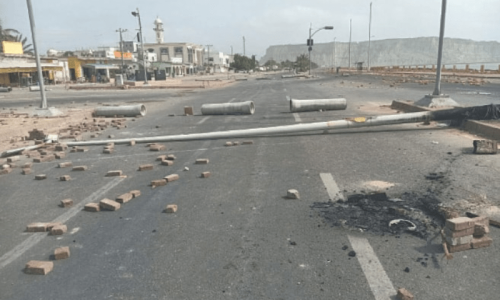
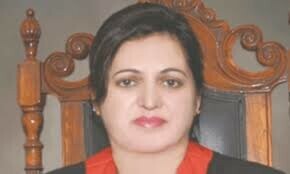















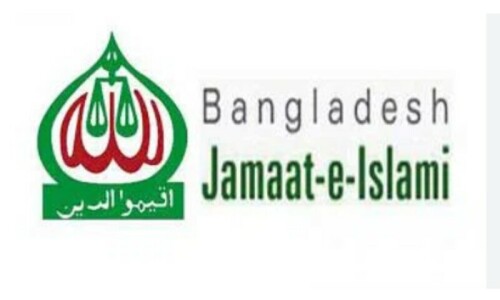
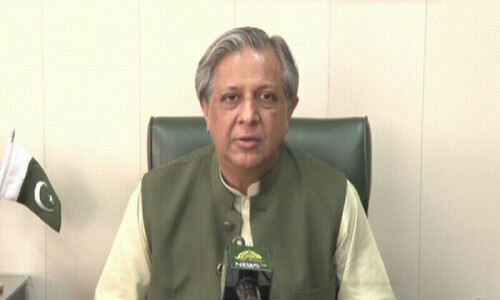
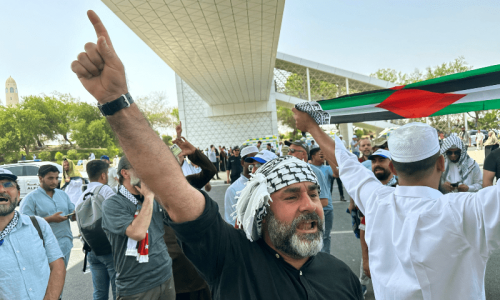














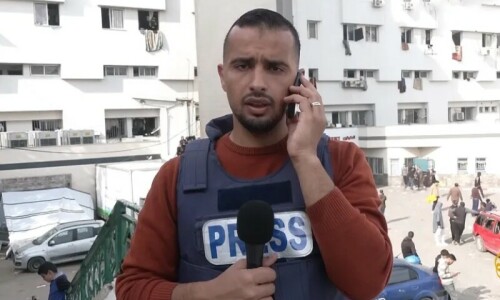

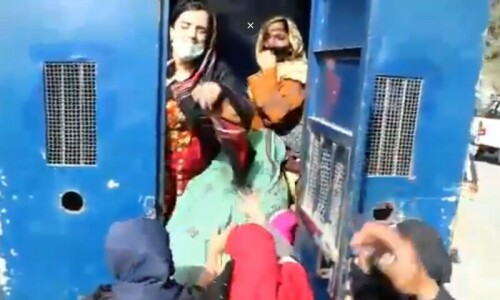










Dear visitor, the comments section is undergoing an overhaul and will return soon.